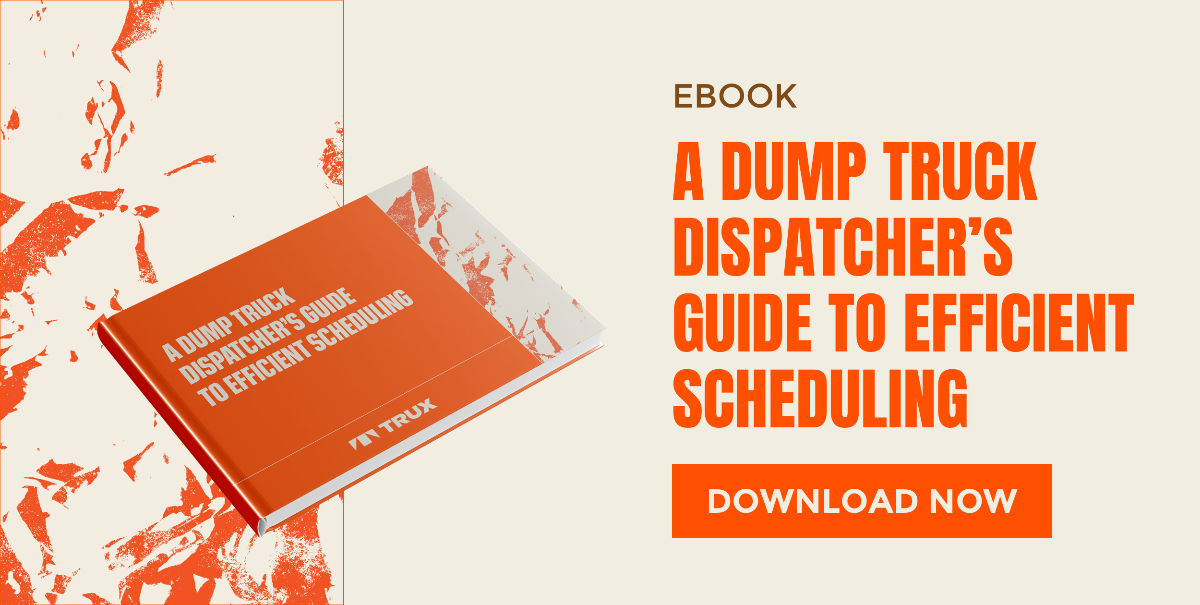6 min read
Successful Shift Management Strategies For Dump Truck Fleet Managers
By: TRUX Team on Nov 21, 2023 10:24:18 AM

In this blog post, we explore the factors that affect driver scheduling and emphasize the significance of effective shift management. We will dive into the challenges faced by managers and dispatchers when it comes to scheduling shifts, discuss the positive impact of efficient scheduling on your business, and highlight the importance of communication in shift management. Additionally, we will provide strategies for more effective scheduling and explain how a software solution like Trux can assist you in this process.
Click a topic below to jump to the relevant section:
The Challenges and importance of effective driver shift management in the dump truck industry
Strategies for Optimal Fleet Utilization And Reducing Scheduling Conflicts
The Role of Communication in Shift Management
The Challenges and importance of effective driver shift management in the dump truck industry
When investigating strategies for successful shift management it is important to understand the challenges involved, and why being effective in this area is essential for success. Let's first look at some of the challenges faced by fleet managers and dispatchers when trying to effectively schedule their trucks.
Challenges:
Variable Schedules: Each project your fleet will be working on has different time requirements and timetables for when they need material to arrive or be removed from the job site. These timetables are changing all of the time making it difficult to keep consistent schedules for the haulers in your fleet.
Unpredictable Workload: Similar to variable schedules is the unpredictability of your actual workload. Seasonality and weather can play a major impact on workload, not to mention other economic factors. These can lead to inconsistent workloads and a need to spread hours evenly among your haulers.
Maintenance and Downtime: It is important for fleet managers and dispatchers to keep track of truck usage and maintenance schedules in order to keep your operation running smoothly. You need to make sure you aren't overworking a truck or aren't scheduling work for a hauler that is due for maintenance. You also need to take into account possible downtime for trucks that may have had a breakdown or other issues and allow yourself room to pick up slack quickly for those assigned projects.
Communication Challenges: Effectively communicating dispatches and instructions to your haulers can be a challenge. Managers and dispatchers need to make sure each hauler knows what their daily responsibilities are so they can be effective throughout the day.
Now that we understand the challenges that dispatchers and fleet managers face when trying to manage shifts, let's look at the daily impact of shift management on the business.
Impact:
Optimized Vehicle Utilization: When shifts are efficiently managed it makes a large impact on your overall utilization. Efficient shift management helps you utilize your trucks to maximum capacity, reduce idle time, and keep trucks operational when they are needed.
Reduced Downtime: When you are scheduling efficiently you can strategically schedule around maintenance and repairs, minimize your downtime, and make the most of the trucks available to you. By planning around these times you can reduce the impact on your operational costs.
Improved Productivity: Well-managed shifts lead to upticks in overall productivity. By aligning your shifts with your current and projected projects you can maximize overall usage.
Fuel Efficiency: Efficient scheduling also leads to fuel efficiency, by scheduling projects to the trucks that make the most sense based on workload and location you can optimize your truck routes and cut your overall operational costs down.
Driver Satisfaction: When loads are scheduled more efficiently you keep your drivers happy. Proper scheduling offers more workload balance and leads to better hauler retention. When drivers are happy with their hours they are more likely to continue working for you.
Strategies for Optimal Fleet Utilization And Reducing Scheduling Conflicts
The best strategy for more efficient scheduling and fleet utilization is adding a software solution to your arsenal of tools. With a software solution, like Trux, you get access to more information that can help you make better use of the trucks you have. Trux gives you visibility into your truck dispatching allowing you to visualize your schedule and set schedules for your drivers in advance as soon as the job details are available. Once assigned, Trux communicates your schedule to your drivers with the assigned dispatch living right on the Trux Drive mobile app. By having visibility into your dispatching schedule, you can make more informed decisions on what haulers you assign to which assignments, and you have visibility into what trucks are still available to you.
With Trux, you get more than just scheduling insights, you also get on-the-job insights and data. With GPS tracking and real-time load tracking you get visibility into how many loads each hauler still has on their assigned job and where they are located. Trux also gives you the ability to further optimize your shifts by load stacking and planning out more than one job in a day to your hauler. With the real-time data you receive, you can make decisions based on utilization or the truck's physical location. Trux enables you to get the most out of your day and maximize profits.
The Role of Communication in Shift Management
Communication is the focal point of every aspect of shift management, so you need tools that enable you to relay information. A solution like Trux can help in the following ways:
Coordination of Tasks: Trux gives your dispatch team full visibility into truck utilization and schedules. By offering visibility your whole team can be connected to the information they need.
Real-Time Updates: When changes to the schedule are needed Trux helps you quickly pivot and communicate those changes. Quickly drag and rearrange assignments to update your haulers' schedules and send notifications right to their phones. Trux also gives you the ability to communicate information with every driver on specific jobs alerting them of changes or issues with just the click of a button.
Scheduling Adjustments: With all of this access to information you can easily and effectively make adjustments to your schedule. If you notice the same haulers being scheduled you can make changes to spread work among your fleet. You can also make real-time changes based on haulers' schedules and locations and communicate those changes more efficiently.
Conclusion
In short, successful shift management is important to your business's overall operation. When your managers and dispatchers are looking to manage hauler's schedules there are many factors that come into play and challenges that they have to keep in mind, such as; variable schedules, unpredictable workload, maintenance and downtime management, and communication. These challenges can be combated by utilizing a software solution like Trux that gives your team more schedule visibility and better communication tools.
Learn more about how Trux can help improve your dispatching efficiency in our eBook.
Frequently asked questions
Q: What are the main challenges in driver shift management for dump truck operations?
A: The primary challenges include scheduling conflicts, ensuring driver safety and compliance with regulations, balancing operational demands with driver well-being, and accommodating unforeseen changes in shift patterns.
Q: How can technology aid in optimal fleet utilization?
A: Technology offers real-time fleet tracking, analytics, and scheduling tools. These help in monitoring vehicle usage, predicting maintenance needs, and ensuring efficient scheduling, leading to maximized fleet utilization and reduced downtime.
Related Posts
Dump Truck Fleet Tips: How to Own & Manage a Fleet of Trucks
Trust us, as industry veterans, we know managing the logistics of your dump truck fleet isn’t easy.
Fleet Management Tracker: GPS Fleet and Vehicle Tracking System
You’ve heard the quote, “Knowledge is power.” You’ve probably read it on a poster somewhere....
Why Material Management is Important for Plant Production | Trux
Running an asphalt or concrete ready-mix plant underscores the importance of running your material...

